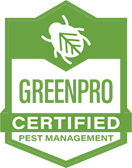
Spider Prevention Made Easy: A Comprehensive Guide For Roseville Homes
If you can choose between solving an easy math problem or a difficult one, you'd probably opt for the uncomplicated problem. Most of us want to find the simplest way to solve a problem because the straightforward way is the best. The less we can complicate life, the better.
No one wants California spiders infesting their Roseville home, but it happens. However, removing spiders permanently from your home does not need a complicated process. We provide the information in this online guide you need to develop a comprehensive solution for a spider-free home.
Although there are steps a homeowner should implement to deter future infestations, you need pest control in Roseville from Neighborly Pest Management to end the current problem. Our family-owned and operated company has removed spiders from local homes since 1978. We have an A+ rating from the Better Business Bureau, and our owner has served as president of the Pest Control Operators of California. On average, our technicians have worked with us for over ten years, which means they are knowledgeable and dependable. Please continue reading to learn what you can do to prevent a future spider invasion once we eliminate the current problem.
.2404180903106.jpg)
The Role Spiders Play In Our Ecosystem
Spiders serve as predators and prey. Most of us are familiar with the large, circular orb weaver spider webs they use to catch unsuspecting insects as they fly around porch lights at night or whisk through the garden. However, they are not the only spider species that build webs, nor do all spiders catch prey in sticky snares. For example, jumping and wolf spiders chase and grab their victims.
Spiders are carnivores that eat insects that get stuck in their webs or caught. Spiders control pest populations by feasting on mosquitoes, lowering the possibility of contracting West Nile virus, dengue, chikungunya, etc. Spiders reduce crop damage by controlling the beetle, grasshopper, and caterpillar populations. Amazingly, a single spider can consume up to 2,000 insects annually.
Although their multiple legs may cause some to mistakenly classify them as insects, spiders are arachnids. Eight jointed legs, two or more rows of eyes, a two-part segmented body, and a lack of wings and antennae set these arthropods apart from insects. In addition to eating insects, some spider species consume other spiders, which also helps to control the spider population.


Ensuring your home and business are pest-free, explore our different service areas to see if we're local to you! Give us a call to get started!
Professional Pest Control Makes The Best Spider Control
Neighborly Pest Management eliminates black widows, wolf spiders, and other common house spiders. We will dispatch a highly trained and experienced technician to your home. We will identify entry points, attractants, hot spots, and the offending spider species. Using the data we collect from the provided information and our investigation, we will create a strategic plan that targets the spiders infesting your house.
Our spider removal process includes de-webbing the house and the minimal application needed to remove the spider population. In addition to removing the spider infestation, we will create a barrier around the home to deter a future invasion. We offer green and organic products when possible and will let you know if we must use a synthetic application. Contact us today to learn about our service options and receive a free quote. Neighborly Pest Management is your best defense against unwanted pests.
-
Same-Day & Emergency Services AvailableWhen possible, we can provide prompt assistance to help with your pest solution needs.
-
Local, Family Owned & OperatedRooted in our local communities, we know the best solutions for the pests in our unique areas.
-
We Offer Organic Treatment OptionsEmbrace a eco-friendly approach with our range of sustainable solutions for your needs.
-
45+ Years of Industry ExperienceTrust in our seasoned knowledge and proven track record spanning over four decades.
A Lot Of Spiders In Your Home Could Mean A Bigger Problem
Spiders are everywhere outside, and while they are necessary for our ecosystem, we do not want them in our Roseville homes. Common spiders in California that invade homes in our area are:
- Cellar spiders
- Common house spiders
- Desert recluse spiders
- Orb weaver spiders
- Yellow sac spiders
- Western black widow spiders
- Wolf spiders
Except for wolf spiders, these spiders create circular or messy webs in corners or dark, secluded spaces; however, wolf spiders live near baseboards and do not build webs. Contrary to horror movies and haunted houses, spiders do not attack people and bite only when threatened. Of the spiders on our list, a wound from a black widow can trigger the most serious medical problems requiring immediate care.
Spiders primarily consume insects, so a spider infestation may indicate that your Roseville home has an insect problem. Some spiders, like house spiders, jumping spiders, black widows, brown recluses, and huntsman spiders, eat cockroaches. The presence of these spider species may indicate the presence of cockroaches in the house. Cockroaches spread diseases and trigger allergy and asthma attacks.
Mosquitoes are a favorite spider dish. When there are webs in porch corners, under eaves, and in plants in the yard, it may be because there is a high mosquito population around the house. As noted above, mosquitoes are vectors for many serious diseases.
Spiders in the house may also indicate a large population of flies. Bacteria from surfaces stick to flies' feet, which they transfer to surfaces in your home. Furthermore, black widow spiders, lynx spiders, and jumping spiders consume ants. Like flies, ants contaminate items in the home, are a nuisance, and can inflict physical damage on the house (carpenter ants). Other ants, like crazy ants, can cause short circuits, resulting in costly appliance repairs.
Insects are food for spiders, so they often enter homes following insects. If the climate experiences a dry season, spiders will invade homes searching for water. Most spiders like warm, moist areas, so a high spider population may indicate leaking fixtures, pipes in the house, damp crawl space, or basement. Poorly ventilated areas under the floor or the attic entice subterranean and drywood termite swarmers. Spiders will eat termites, but termites usually stay hidden in the dirt or wood. However, spiders prey on silverfish, earwigs, and centipedes that inhabit moist areas.
Neighborly Pest Management is your besthome defense for spiders. When we inspect your Roseville house, we can determine if the spider population is a symptom of an insect problem. If so, we can pivot to address the insect infestation while removing the spider population.
Six Simple And Natural Spider Prevention Tips
Once the highly trained technicians from Neighborly Pest Management eradicate the spider from your Roseville home, you do not want to risk a secondary invasion. Here a six simple tips you can implement to prevent spiders in your home:
- Seal cracks in the foundation and roofline.
- Prune tree branches and shrubs away from the house.
- Repair leaking pipes and fixtures.
- Replace outdoor lights with bug lights.
- Install door sweeps on exterior doors.
- Fix holes in window and door screens.
Using caulk to close gaps between incoming pipes and wires, foundation and roofline cracks, and spaces around exterior utility boxes will help prevent spiders from entering the house. Trim branches and shrubs to prevent spiders from using them as highways onto window sills, roofs, and masonry.
Since light attracts moths, beetles, swarming ants and termites, and other insects, minimizing outdoor lighting and keeping curtains closed will deter insects from flying around the house and discourage spiders from following them. Holes in screens and gaps under doors enable insects to enter the house, and spiders will follow using those same access points.
Other easy suggestions to deter spiders and insects from your Roseville house include keeping garbage containers closed and removing excess boxes, magazines, and clutter in the house, garage, basement, attic, and crawl space. Maintaining a clean, dry interior and exterior will discourage insects and spiders from entering your home once our technicians from Neighborly Pest Management end the current infestation.

Hear From Our Happy Customers
At Neighborly Pest Management, your satisfaction is our priority! See for yourself what our customers have to say about working with us.
-
“Nate is an excellent technician. He is a big reason we’re so happy with the service! Overall a great company and fair pricing.”- M.D.
-
“My technician Doug Stone is amazing!! To say he goes above and beyond to maintain my property is an understatement! He took care of the issue and took the initiative to repair the garage door where my unwanted friends were getting in. Problem solved!!”- Jill M.
-
“Super friendly and professional. I appreciate the thoughtfulness and professionalism Adam displayed on our initial visit and feel confident he is taking excellent care of my home.”- Erin D.
-
“I have been working with Doug from Neighborly for over two years now, and it has been a pleasure. He is always friendly and knowledgeable and has taken care of every pest situation we have encountered.”- Holly K.
-
“Adam was fantastic! Super friendly and professional. I felt at ease and knew I could ask any question, no matter how dumb it sounded, and he was able to answer and provide more information based on my concerns.”- Erin D.
-
“We can't share enough positive feedback about Doug and Neighborly Pest. Doug has always gone above and beyond to make sure our house stays bug-free!! He's considerate and always follows up to see how things are going after his visit.”- Sabrina C.





